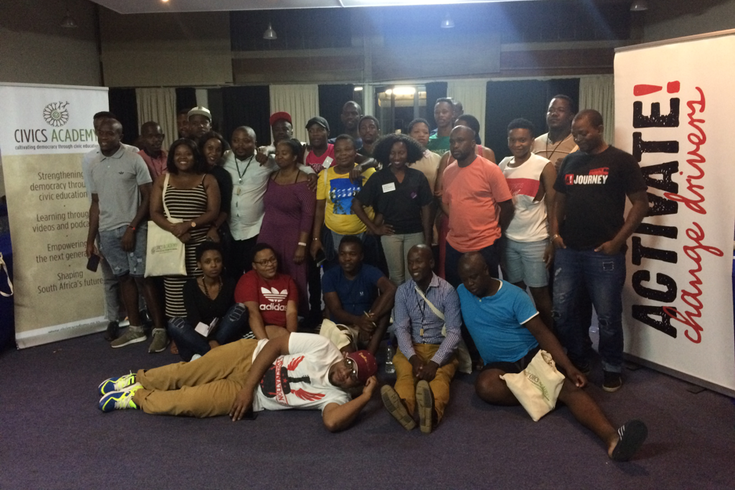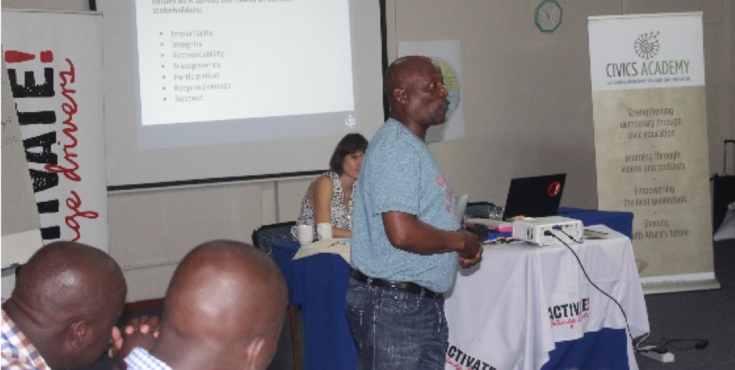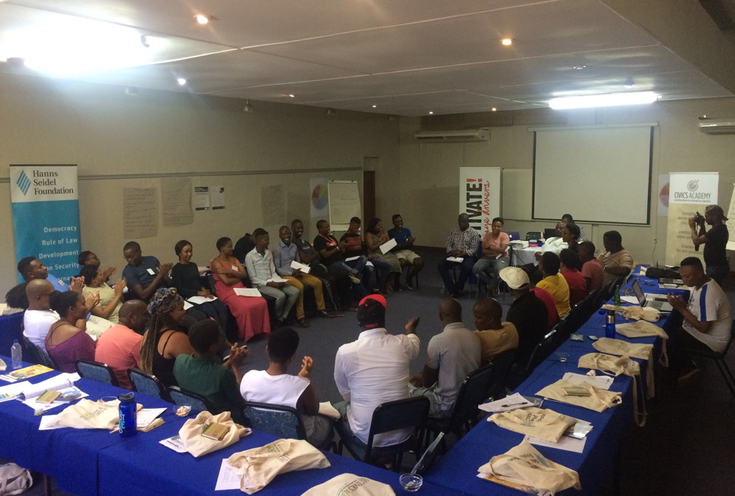Youth workshop run by Civics Academy and partners
Train the Trainer workshop on the Election and Community Manifesto Campaign

Participants at the Train the Trainer workshop
HSF
Participants and objectives
The workshop participants came from the Activate Change Drivers, Civics Academy and Khulisa Social Solutions and had travelled from across the country. The aim of the workshop was to give the participants tools they can use to educate other young people in their communities about all aspects of voting and the elections. The various publications from the IEC as well as the Civics Academy videos and learning materials were introduced to the participants, who were encouraged to use these materials in their outreach work.
The objectives of the workshop were
- To increase the number of young voters
- To improve the understanding of the importance of voting, and the electoral process by young people across the country, through peer education.
- To improve engagement with the Party Manifestos by youth before, during and after the elections.
- To influence youth to be at the forefront of championing youth matters in the 2019 elections.

IEC representative Mr. Moses Pitso running a session on the electoral process
HSF
Content and context
The workshop content explored and discussed participants’ understanding of what democracy means and the importance of elections, and a Civics Academy video was used as well (http://www.civicsacademy.co.za/video/why-should-i-vote/) . It also outlined the key milestones in the electoral process with a focus on how community members can interact with the process at the different levels. The IEC supported the workshop through Mr Moses Pitso from the Outreach Division who gave an insightful presentation on the key milestones in the electoral cycle and engaged the participants in a lively discussion about various aspects of democracy and voting.
The workshop also trained participants on the development of so-called Community Manifestos. A Community Manifesto is a tool which the participants can use to ascertain and communicate the needs and priorities that young people identified in their communities. Running up to the national elections, these Manifestos will serve as way for young people to meaningfully engage with the manifestos of the various political parties and assist them in making responsible and educated choices on election day.
This workshop forms part of a broader civic education campaign which covers the entire pre-, during and post-election cycle. The next step is to consolidate the various Community Manifestos and to provide a platform where young people from across the country can present and prioritise the issues that they identified. After the elections, the campaign will focus on empowering young people to use the structures they can access especially at the local government level, like the Party Liaison Committee – to name only one example – to continuously engage their political representatives on the promises they made. Ultimately this process will encourage young people to collaborate with local government structures to improve their communities long after the elections are over.

Group discussion on the importance of voting
HSF
Outcomes
It became evident during the workshop that participants had very different understandings of what democracy actually means. While everyone understood the importance of voting from the outset, the workshop assisted in identifying the various ways in which active citizens can engage with their political representatives in all stages of the election cycle.
The workshop closed with small group presentations of mock community engagement, where participants proactively used the materials that were presented to them and came up with innovative and creative ways to deliver the content to their peers.
Two freelance writers and social media experts documented the process on social media, where it has attracted a lot of interest from civil society groups and individuals wanting to learn more and find out how they can get involved. It is now up to the participants to use the educational materials and their learnings in their work within their communities. Participants were encouraged to share their work in the community on social media and the partners look forward to following the discussions online.
